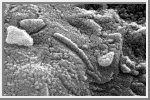|
Mars is the fourth planet from the Sun and is commonly referred
to as the Red Planet. The rocks, soil and sky have a red or pink hue. The distinct red color was observed by stargazers throughout
history. It was given its name by the Romans in honor of their god of war. Other civilizations have had similar names. The
ancient Egyptians named the planet Her Descher meaning the red one.
Before space exploration, Mars was considered the best candidate
for harboring extraterrestrial life. Astronomers thought they saw straight lines crisscrossing its surface. This led to the
popular belief that irrigation canals on the planet had been constructed by intelligent beings. In 1938, when Orson Welles
broadcasted a radio drama based on the science fiction classic War of the Worlds by H.G. Wells, enough people believed
in the tale of invading Martians to cause a near panic.
Another reason for scientists to expect life on Mars had to
do with the apparent seasonal color changes on the planet's surface. This phenomenon led to speculation that conditions might
support a bloom of Martian vegetation during the warmer months and cause plant life to become dormant during colder periods.

In July of 1965, Marina 4, transmitted 22 close-up pictures of Mars. All that was revealed was a surface containing many craters and
naturally occurring channels but no evidence of artificial canals or flowing water. Finally, in July and September 1976, Viking
Landers 1 and 2 touched down on the surface of Mars. The three
biology experiments aboard the landers discovered unexpected and enigmatic chemical activity in the Martian soil, but provided
no clear evidence for the presence of living microorganisms in the soil near the landing sites. According to mission biologists,
Mars is self-sterilizing. They believe the combination of solar ultraviolet radiation that saturates the surface, the extreme dryness of the soil and the oxidizing nature of the soil chemistry
prevent the formation of living organisms in the Martian soil. The question of life on Mars at some time in the distant past
remains open.
Other instruments found no sign of organic chemistry at either
landing site, but they did provide a precise and definitive analysis of the composition of the Martian atmosphere and found
previously undetected trace elements.
Atmosphere
The atmosphere of Mars is quite different from that of Earth. It is composed primarily of carbon
dioxide with small amounts of other gases. The six most common components of the atmosphere are:
- Carbon Dioxide (CO2): 95.32%
- Nitrogen (N2): 2.7%
- Argon (Ar): 1.6%
- Oxygen (O2): 0.13%
- Water (H2O): 0.03%
- Neon (Ne): 0.00025 %
Martian air contains only about 1/1,000 as much water as our air, but even this small amount
can condense out, forming clouds that ride high in the atmosphere or swirl around the slopes of towering volcanoes. Local
patches of early morning fog can form in valleys. At the Viking Lander 2 site, a thin layer of water frost covered the ground
each winter.
There is evidence that in the past a denser martian atmosphere may have allowed water to flow
on the planet. Physical features closely resembling shorelines, gorges, riverbeds and islands suggest that great rivers once
marked the planet.
Temperature and Pressure
The average recorded temperature on Mars is -63° C (-81° F) with a maximum temperature of 20°
C (68° F) and a minimum of -140° C (-220° F).
Barometric pressure varies at each landing site on a semiannual basis. Carbon dioxide, the major
constituent of the atmosphere, freezes out to form an immense polar cap, alternately at each pole. The carbon dioxide forms
a great cover of snow and then evaporates again with the coming of spring in each hemisphere. When the southern cap was largest,
the mean daily pressure observed by Viking Lander 1 was as low as 6.8 millibars; at other times of the year it was as high
as 9.0 millibars. The pressures at the Viking Lander 2 site were 7.3 and 10.8 millibars. In comparison, the average pressure
of the Earth is 1000 millibars.
Life from Mars
A NASA research team of scientists at the Johnson Space Center and at Stanford University
has found evidence that strongly suggests primitive life may have existed on Mars more than 3.6 billion years ago.
The NASA-funded team found the first organic molecules thought to be of Martian origin; several
mineral features characteristic of biological activity; and possible microscopic fossils of primitive, bacteria-like organisms
inside of an ancient Martian rock that fell to Earth as a meteorite. This array of indirect evidence of past life will be
reported in the August 16 issue of the journal Science, presenting the investigation to the scientific community at
large to reach a future consensus that will either confirm or deny the team's conclusion.

|

